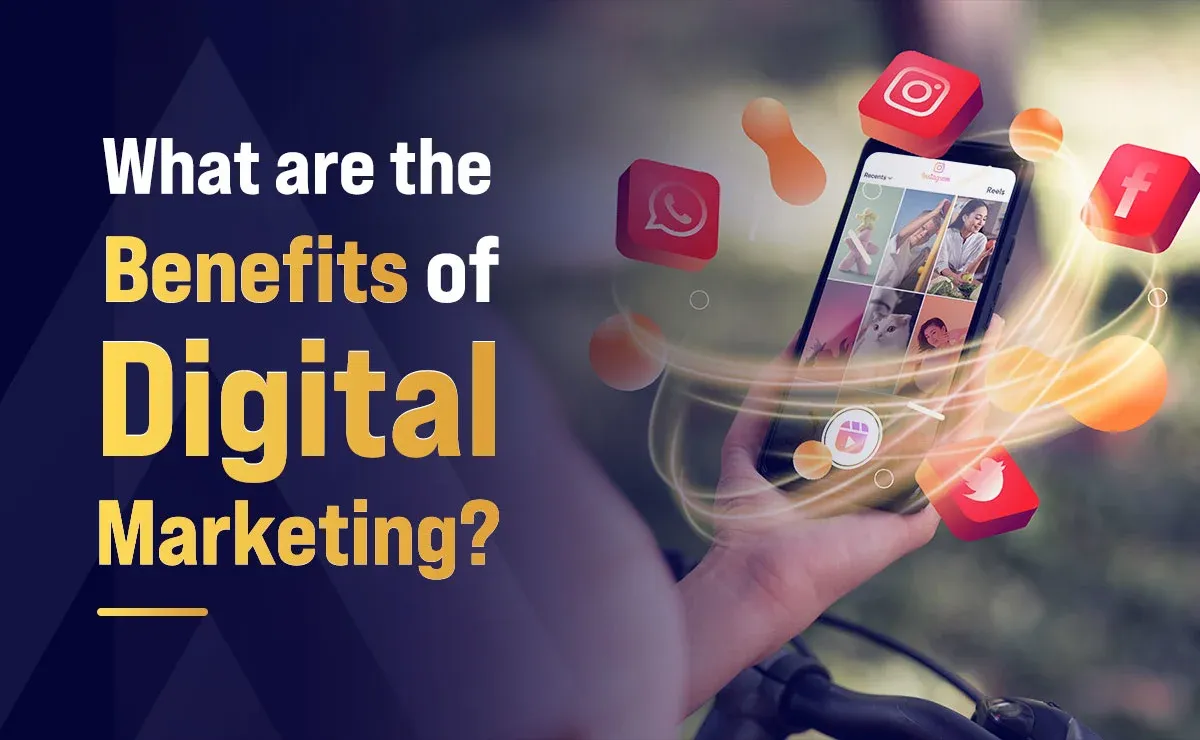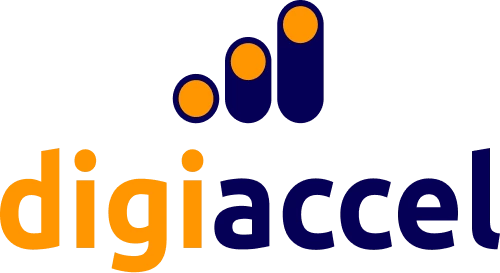What are the Benefits of Digital Marketing?

Digital marketing has shifted from being a secondary activity to a vital strategic necessity for businesses across India. With the country emerging as the world's second-largest digital market, boasting over 900 million internet users, and global digital ad spend surpassing $790 billion in 2024, understanding the benefits of digital marketing has become essential for businesses seeking sustainable growth and competitive advantage.
The digital revolution has created unprecedented opportunities for brands to engage with their target audiences, which is more effective than ever before. Hence, this article explores some of the most impactful benefits of digital marketing that will help you refine your strategy for success.
What Is Digital Marketing?
Digital marketing is the use of digital channels to market products and services, boost brand awareness, drive traffic, and achieve marketing goals. It encompasses all marketing activities that utilize digital platforms and technologies, including search engines, websites, social media, mobile apps, email, and web-based advertising.
While traditional marketing depends on offline mediums like newspapers, TV, or broadcasts, digital marketing harnesses the internet and smart devices to engage audiences where they are most active. It uses the same fundamental principles as traditional marketing but offers enhanced capabilities for targeting, measurement, and personalization through data-driven insights.
The Digital Revolution Transforming Business Landscape

India's digital marketing industry is experiencing explosive growth, with the market size projected to expand from $5.15 billion in 2024 to an astounding $55.37 billion by 2032, representing a remarkable compound annual growth rate (CAGR) of 30.2%. This exponential growth trajectory reflects the fundamental shift in how Indian businesses engage with consumers and highlights the immense career potential for graduates specializing in digital marketing.
This transformation is driven by several key factors: widespread smartphone adoption, affordable data plans making internet accessible across all economic segments, and government initiatives like Digital India that have accelerated digital infrastructure development.
This digital revolution has created an ecosystem where businesses of all sizes, from startups to multinational corporations, require sophisticated digital marketing strategies to remain competitive.
All Important Benefits of Digital Marketing
Understanding the potential benefits of digital marketing allows businesses to design targeted campaigns, allocate resources wisely, and maximize returns on their investment. Below are the most impactful advantages of digital marketing.
1) Global Reach
Digital marketing eliminates geographical constraints, allowing brands to connect with consumers worldwide, provided they have internet access available. Unlike conventional strategies restricted by location and logistics, digital avenues offer immediate entry into international markets. This global reach is particularly powerful when combined with local relevance, allowing businesses to maintain cultural sensitivity while expanding internationally.
The statistics demonstrate this remarkable reach: there are now 5.56 billion internet users worldwide, representing 67.9% of the global population. Social media platforms host 5.24 billion user identities, accounting for 63.9% of all people on Earth. This vast online user base presents unmatched potential for businesses to engage diverse audiences across various regions and demographics.
2) Cost Efficiency
Digital marketing offers superior cost efficiency compared to traditional marketing methods, making it accessible to businesses of all sizes. While traditional marketing campaigns often require substantial upfront investments for production and distribution, digital marketing provides flexible budget options that can be adjusted based on performance and business needs.
Digital marketing's cost efficiency extends beyond initial spending to include better resource allocation and higher return on investment. Businesses can allocate their marketing budgets more precisely, targeting specific audiences most likely to convert rather than broadcasting to broad, general audiences. This targeted approach significantly reduces wasted spending and improves overall campaign effectiveness.
3) Measurable Results
Among digital marketing’s greatest strengths is its ability to deliver detailed, instant analytics and trackable outcomes. It includes detailed metrics, including website traffic, click-through rates, conversion rates, engagement levels, and customer lifetime value. These analytics allow marketers to understand not just what happened, but why it happened, enabling continuous optimization and improvement of campaigns.
The ability to measure results in real time transforms marketing from an intuitive practice to a data-backed discipline. Marketers can precisely identify which campaigns are performing well and which need adjustment, allowing for immediate optimization. This measurability applies to every phase of the customer journey, from brand discovery through final purchase and beyond, offering a comprehensive view of marketing performance.
4) Effective Targeting
Digital marketing allows unmatched accuracy in audience segmentation, ensuring the ideal consumers receive tailored messaging at the optimal times. Advanced targeting capabilities include demographic segmentation, geographic targeting, behavioral analysis, and interest-based filtering, ensuring marketing messages reach the most relevant prospects.
Marketers can also target audiences based on age, gender, income, education level, job title, interests, online behaviors, purchase history, and even life events. Its effectiveness is further enhanced by machine learning and AI, which continuously optimize targeting parameters based on performance data. Such tools facilitate anticipatory targeting, pinpointing prospects who mirror top-tier customers, thus broadening influence without sacrificing precision.
5) Increased Engagement
Digital marketing enables interactive communication between businesses and their audiences, fostering deeper engagement than traditional advertising methods. Social media platforms, interactive content, and real-time communication channels enable businesses to build relationships rather than simply broadcast messages.
These engagement capabilities of digital marketing enable brands to respond to customer queries, address concerns, and participate in conversations, all while humanizing the brand and building trust. Strong engagement often leads to greater brand affinity, improved sales rates, and higher customer retention, making it a key performance indicator.
6) Flexibility
Digital marketing offers unparalleled flexibility in campaign management, content distribution, and strategy adjustment. This agility also applies to budget allocation, letting businesses adjust spending based on results, seasonal trends, or shifting objectives. Automated bidding systems and real-time optimization tools further enhance campaign refinement without manual intervention.
The flexibility of digital marketing is particularly valuable in rapidly changing market conditions. Businesses can quickly pivot their messaging, adjust targeting parameters, or shift budgets between channels in response to new opportunities or challenges. Such adaptability offers a major competitive edge, allowing quicker responses to industry shifts than outdated marketing tactics.
7) Improved Conversion Rate
The ability to test and optimize every element of the shopper journey is a unique advantage of digital marketing. Marketers can test various headlines, visuals, call-to-action buttons, form structures, and page designs to determine the best-performing combinations. This continuous optimization approach often results in significant conversion rate improvements for businesses.
Advanced analytics and user behavior tracking provide insights into conversion barriers and optimization opportunities. Heatmaps, session recordings, and funnel analysis reveal exactly where potential customers encounter difficulties or lose interest, enabling targeted improvements. An analytics-backed strategy for maximizing conversions ensures marketing budgets deliver optimal ROI.
8) Social Currency
Digital marketing enables businesses to build social currency, which refers to the brand's value and influence within social networks and online communities. Social currency is generated when customers share brand content, recommend products to friends, and engage with brand messaging in ways that enhance the brand's reputation and reach.
Building social currency through digital marketing creates exponential value, as satisfied customers become brand advocates who promote the business within their personal networks. This word-of-mouth amplification is particularly powerful because recommendations from friends and peers are trusted more than traditional advertising messages. Studies show 92% of buyers value personal recommendations more than branded advertisements.
9) Greater ROI
Multiple factors contribute to digital marketing's superior ROI performance. Low entry expenses allow brands to achieve significant exposure without heavy initial spending. Accurate targeting minimizes waste by directing efforts toward the most likely prospects. Real-time optimization enables continuous improvement of campaign performance, maximizing the value derived from every marketing dollar.
Industry data supports the ROI advantages of digital marketing across various sectors. Email marketing, for example, generates an average return of $42 for every $1 invested. Social media campaigns deliver quantifiable interactions and sales tracking, allowing accurate ROI measurement. Search engine marketing delivers highly qualified traffic with clear attribution to revenue generation, making ROI calculation straightforward and actionable.
Emerging Trends and Future Opportunities in Digital Marketing
Digital marketing is undergoing a revolutionary transformation as we advance through 2025, driven by groundbreaking technologies and evolving consumer expectations. The convergence of artificial intelligence, immersive technologies, and quantum computing is creating unprecedented opportunities for marketers to engage with audiences in ways previously thought impossible.

1) AI and Machine Learning
Artificial intelligence has progressed from basic automation functions to becoming a central element of advanced marketing strategies. About 92 percent of digital marketers now use AI in daily workflows. AI powers hyper-personalization experiences, behavior forecasting, and instant campaign adjustments. Consumers expect tailored experiences, with almost 67% wanting personalized online shopping. Generative AI is being adopted for content creation, with 42% of marketing teams prioritizing it to produce multiple content variants and accelerate testing.
2) Voice Search and Conversational Marketing
With voice search and smart devices altering how users seek information, marketers must adapt to natural-language queries. At the same time, AI chatbots have evolved into true conversational agents that handle lead capture, product recommendations, and even transactions, improving customer satisfaction while lowering operating costs.
3) AR, VR, and the Metaverse
Augmented reality and virtual reality create interactive brand experiences that bridge the physical and the digital gap. Virtual try on tools, 3D product demos, and live virtual events boost engagement and reduce friction for purchase decisions. The metaverse represents a large market opportunity, with brands experimenting with virtual storefronts, events, and digital goods to create deeper emotional connections.
4) Web3 and Blockchain
Web3 introduces decentralization, stronger data ownership, and new monetization models. Blockchain can reduce ad fraud and improve attribution accuracy. Token based loyalty programs, NFT campaigns, and DAO community models open fresh routes for engagement and revenue while giving users more control over their data.
5) Marketing Automation and Omnichannel Orchestration
Marketing automation is evolving toward true omnichannel integration, creating seamless customer experiences across all digital touchpoints. Sophisticated AI-driven tools now craft individualized customer experiences that evolve based on user actions and preferences. Cross-channel automation also ensures consistent messaging and branding while optimizing campaign performance across email, social media, search engines, and mobile platforms.
6) Privacy-First Strategies and First-Party Data
The reduction of third-party cookies is speeding the transition toward first-party data usage and contextual-based targeting. Marketers are building trust through transparent data collection, consent-based marketing, and anonymized analytics. Contextual advertising and robust first-party data strategies are becoming core capabilities.
7) Sustainability and Purpose-Driven Marketing
Environmental awareness and social responsibility are now central to digital marketing. Purpose-driven campaigns that spotlight sustainability, social impact, and ethical practices resonate much quicker with today’s consumers. Carbon-neutral ads and eco-friendly content production are becoming competitive differentiators that deepen emotional ties with conscious buyers.
Summing Up
Digital marketing is now a non-negotiable strategy for businesses striving to succeed in an interconnected, tech-driven marketplace. Its ability to deliver global reach, cost efficiency, precise targeting, and measurable results makes it far more impactful than many traditional methods.
By fostering engagement, building social currency, and improving conversion rates, digital marketing empowers brands to create lasting customer relationships. Its scalability and responsiveness provide a crucial advantage in fluctuating economic climates.
As India’s digital infrastructure expands, companies prioritizing strategic digital marketing investments will lead to sustained growth and profitability.

